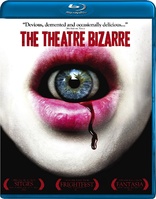The Theatre Bizarre Blu-ray Movie
HomeThe Theatre Bizarre Blu-ray Movie 
Image Entertainment | 2011 | 114 min | Not rated | Sep 03, 2013Movie rating
6.2 | / 10 |
Blu-ray rating
| Users | 0.0 | |
| Reviewer | 3.5 | |
| Overall | 3.5 |
Overview
The Theatre Bizarre (2011)
Down a seedy city street in her neighborhood, young Enola Penny is obsessed with what appears to be a long abandoned theatre. One night, she sees that the front door is slightly ajar and impulsively decides to sneak inside. But there in the dark, decrepit auditorium, a show unlike any other unfolds before her eyes. Its host is an eerie human puppet named Peg Poett who will introduce Penny to six tales of the bizarre ...
Starring: Virginia Newcomb, Udo Kier, André Hennicke, Debbie Rochon, Tom SaviniDirector: Douglas Buck, Buddy Giovinazzo, David Gregory (III), Karim Hussain, Jeremy Kasten
| Horror | 100% |
Specifications
Video
Video codec: MPEG-4 AVC
Video resolution: 1080p
Aspect ratio: 2.39:1
Original aspect ratio: 2.39:1
Audio
English: DTS-HD Master Audio 5.1 (48kHz, 24-bit)
Subtitles
None
Discs
25GB Blu-ray Disc
Single disc (1 BD)
Playback
Region A (locked)
Review
Rating summary
| Movie | 3.5 | |
| Video | 4.0 | |
| Audio | 4.0 | |
| Extras | 0.0 | |
| Overall | 3.5 |
The Theatre Bizarre Blu-ray Movie Review
The Theatre Isn't Dead, but It Might Kill You
Reviewed by Michael Reuben September 3, 2013Anthology horror films like Creepshow and Tales from the Darkside: The Movie haven't gone away. They're just skulking in the shadows of film festivals and independent distribution. The Theatre Bizarre was a 2011 co-production of Severin Films and French company Metaluna Productions. It received a theatrical release in France and played festivals in Europe and Canada, but in America it went straight to DVD. Image Entertainment, which issued the DVD in April 2012, is now upgrading the film to Blu-ray. Each of six directors was given the same budget and schedule for an original horror short, with no other constraints or directives. Several of the directors were well-known genre veterans. Make-up artist Tom Savini is famous for his work with George Romero, as well as on such gore-fests as Maniac (1980) and the original Friday the 13th (1980). He also directed the 1990 remake of Night of the Living Dead. Richard Stanley is the writer/director of the 1984 cult classic Hardware. Less known but equally ambitious were Douglas Buck, director of the daring but unsuccessful remake of Brian De Palma's Sisters; Buddy Giovinazzo, who made a splash with the grim Combat Shock in 1984, then took a ten-year break to teach filmmaking; David Gregory, director of Plague Town as well as numerous documentaries on horror films and their makers; and Karim Hussain, cinematographer of Hobo with a Shotgun and Antiviral, among others, who also shot several segments for his fellow directors on The Theatre Bizarre. The stories were woven together by a framing narrative set in a decaying theatre populated by ghostly creatures both on and off the stage. The frame was created by a seventh director, Jeremy Kasten, who has filmed numerous "First Looks" for HBO and EPKs for other studios. Kasten also has the distinction of having remade in 2007 The Wizard of Gore, one of the best-known works by Herschell Gordon Lewis, the Godfather of Gore. I've never seen Kasten's remake, but if the effort alone doesn't qualify him to participate in The Theatre Bizarre, I can't imagine what would.
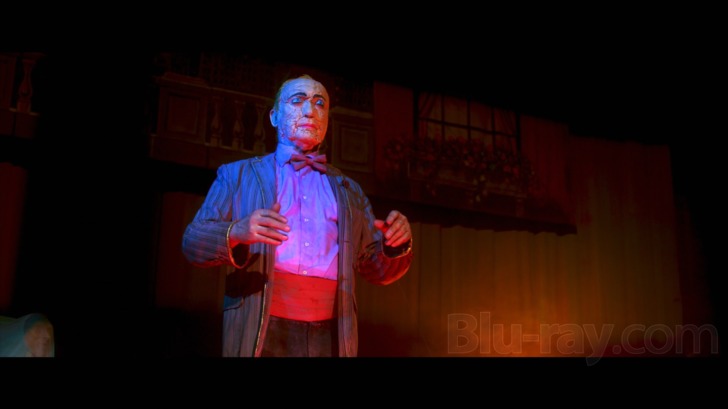
In the film's framing device, entitled "Theatre Guignol", a hollow-eyed girl named Enola Penny (Virginia Newcomb) is intrigued by a seemingly abandoned theater that she sees from her room. One night, the theater mysteriously lights up and its doors open, as if just for her. Enola enters to find a few audience members randomly scattered around the auditorium. Suddenly a master of ceremonies appears. He has a paper-mâché face and moves with the jerky motions of a marionette, except that he has no strings. He is identified in the credits as "Peg Poett", and his speech is often barely intelligible, because he's played by that specialist of the weird, Udo Kier. As Penny sits in the theater, Peg Poett introduces a series of stories, each preceded by a cryptic pronouncement. When each story concludes, the film returns to the theater, where Peg's face gradually evolves through the night, although I cannot be more specific without spoilers. The first story, entitled "The Mother of Toads", is directed by Richard Stanley, and it is the closest that The Theatre Bizarre comes to a classic "creature feature". A young couple, Martin and Katrina (Shane Woodward and Victoria Maurette), are touring France, when they encounter an old woman, Mere Antoinette (Catriona MacColl), whose market stall features earrings bearing symbols from the fictional book invented by H.P. Lovecraft known as the Necronomicon. Martin is fascinated by the occult and immediately perks up when Mere Antoinette claims to own a copy of the fabled volume. Against Katrina's wishes, he makes an appointment to visit the older woman at her home to inspect the book, while Katrina goes sightseeing. When Martin arrives at Mere Antoinette's toad-infested country home, she plies him with home brew while showing him a book filled with strange illustrations, of which the most disturbing depicts a huge upright reptile that she identifies as the Mother of Toads. Since her name is "Mere" Antoinette, one would think Martin might make the connection, but perhaps he's too far gone from the potions he's been drinking. By the time Katrina arrives to pick up Martin, he is otherwise engaged, and the massing forest toads have plans for them both. Buddy Giovinazzo's "I Love You" is a complete change of pace. In Berlin, a man named Axel (André Hennicke) awakens from a drunken stupor on his bathroom floor with a cut on his hand and no memory of how he got it. He assumes he broke a glass. He is leaving voicemail messages for his best friend and his wife, when the wife, Mo (Suzan Anbeh), arrives to announce that she is leaving him. Axel and Mo proceed to have a brutally frank exchange about how unhappy she has been in the marriage. The more he begs her to stay, the worse she hurts him in an effort to convince him that the marriage is over. Just as Mo is about to leave, the doorbell rings, and it is Axel's best friend, George (Harvey Friedman), whose guilty face confirms that he is "the other man". But that isn't the end of the story. Something else has been happening of which we were unaware, and it changes the import of everything we've seen up to this point. Tom Savini co-stars in his story, "Wet Dreams", as a psychiatrist, Dr. Maurey, treating a young husband, Donnie (James Gill), who suffers from recurrent terrifying nightmares of graphic castration as a result of cheating on his wife, Carla (Debbie Rochon). Both Dr. Maurey's manner and his counsel are unorthodox, but Donnie takes the therapist's advice, and at first it seems to be working. But then his dreams become a hall of mirrors, giving new meaning to the notion of a "dream within a dream". Douglas Buck's "The Accident" almost feels like it came from another movie. A daughter (Mélodie Simard) asks her mother (Lena Kleine) about death after witnessing a highway fatality. The mother does her best to assuage the child's fear, and her soothing words are accompanied by graphic flashbacks of the accident, which involved a motorcyclist and a large deer crossing a country road. It's a touching and moving vignette, but it feels almost out of place in a horror film. In "Vision Stains", director Karim Hussain presents an unnamed writer (Kaniehtiio Horn) with an unusual project: She "honors" the lives of women discarded by society—junkies, the homeless, crack whores—by killing them, then extracting their vital memories as life flashes before them in the moment of death and re-experiencing those memories so that she can write them down. The key to this transference is the extraction of a vital fluid that collects in the victim's eye just after death. When the writer injects it into her own eye, she sees the victim's last moments in a rush of images. Her efforts have yielded a roomful of manuscripts, which are her life's work. One day, though, the writer goes too far. The line she crosses isn't entirely clear, either metaphysically or within the pseudo-scientific terms established by the story, but the results are devastating. Because the writer's transgression isn't spelled out, "Vision Stains" ends with a resolution that is bloody but not entirely satisfying, but maybe it doesn't matter. As the great film director Luis Buñuel discovered early in the history of cinema with Un Chien Andalou, few images have greater impact than the literal violation of an eye, and "Vision Stains" is all about exploring that theme. The final story, David Gregory's "Sweets", may remind some viewers of the Mr. Creosote routine in Monty Python's The Meaning of Life, because it takes place in a surreal world where everyone gorges on food in the most disgusting manner possible. The opening shows Greg (Guilford Adams) and Estelle (Lindsay Goranson) in the throes of a breakup. He is begging her for another chance, while she is coldly saying that her feelings have changed—but both of them keep eating, though Estelle eats less, as if her emotional distance expressed itself in a loss of appetite. Eventually she appears to relent and tells Greg she'll see him later. Estelle then retreats to an elaborate party thrown by Mikela Da Vinci (Lynn Lowry), at which all the guests are literally stuffing their faces. What happens next is quite remarkable. However, Estelle does keep her promise to Greg. And then we return to the theater for one last visit with Enola Penny and Peg Poett.
The Theatre Bizarre Blu-ray Movie, Video Quality 
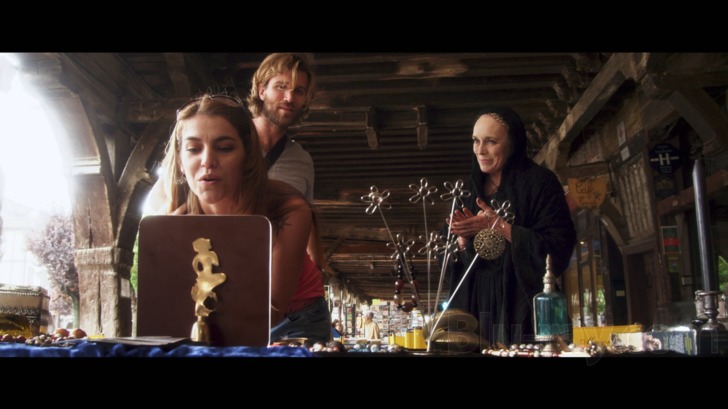
Four cinematographers are credited for the various segments of The Theatre Bizarre, but they all used Red One cameras, which, despite a wide variety of styles, palettes and production designs, have yielded a consistently superior result for Image Entertainment's 1080p, AVC-encoded Blu-ray. After post-production on a digital intermediate, the Blu-ray is equally adept at providing the unrelentingly dark corners and deep shadows of "Vision Stains" and the overlit, candy-colored surfaces of "Sweets" (much of which is garishly lit to look like a commercial). The image easily shifts between the naturalistic French countryside in "The Mother of Toads" to its nightmare world of fog and enchantment (and other things) conjured up by the mystic reptiles. Throughout, the image is clear, sharp and finely detailed, except where it has been deliberately softened or obscured for effect (e.g., to help "sell" certain makeup illusions). As is typically the case with projects finished on a DI, the Blu-ray appears to have been sourced from digital files. With no extras, despite jacket copy claiming otherwise (see below), the 114-minute film fits onto a BD-25, but just barely. The average bitrate of 19.99 Mbps would seem anemic, but it's acceptable given the letterbox bars on the 2.39:1 image and the fact that Red footage is easily compressible.
The Theatre Bizarre Blu-ray Movie, Audio Quality 
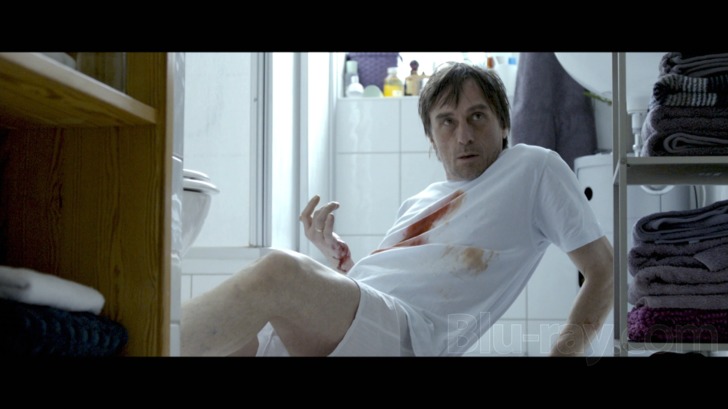
The film's original 5.1 soundtrack is presented as DTS-HD MA 5.1, and it's quite good considering the film's limited budget. The toads in "The Mother of Toads" are intimidating as they surround their victims. Nightmare screams in "Wet Dreams" and other sounds that I can't characterize without spoilers have a piercing impact. In "The Accident", the sounds of the mother and daughter's bedtime conversations mix subtly with the child's memory of sounds from their roadside encounter. The writer's recovered memories in "Vision Stains" are accompanied by memorable rushes and cacophonies of overlapping sounds. All of this is delivered with clarity and a wide dynamic range that also serves the scores by composers Simon Boswell (Tin Man), Susan DiBona, Pierre Marchand (a frequent collaborator with Sarah McLachlan) and Mark Raskin (Plague Town).
The Theatre Bizarre Blu-ray Movie, Special Features and Extras 
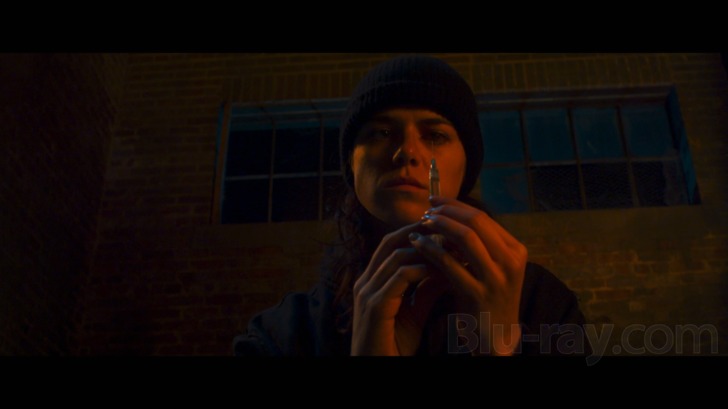
The back cover of the Blu-ray case lists the same special features listed on the DVD (Trailer; Directors' Commentary; Behind the Scenes; Directors' Interviews). However, no extras appear on the disc. The DVD did indeed include: a clever trailer; a commentary with most of the directors and several of the actors; "behind the scenes" segments for four of the six stories, plus the "Theatre Guignol" frame; and interviews with directors Kasten, Giovinazzo and Gregory. To repeat, however: No extras appear on the Blu-ray.
The Theatre Bizarre Blu-ray Movie, Overall Score and Recommendation 
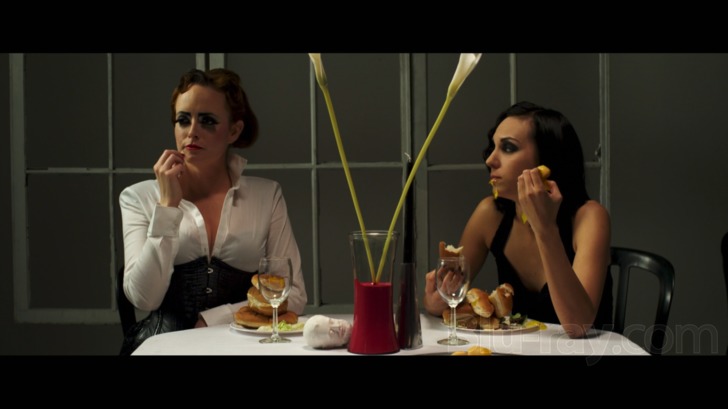
Like many anthology films, The Theatre Bizarre is uneven, and the variations are especially obvious because no unifying creative oversight was imposed on the individual directors. In some ways, that's a plus, since individual visions are allowed their full expression, but it's also a minus, because the "Theatre Guignol" framework can't possibly handle the transitions in tone between stories as disparate as, say, "The Accident" and "Sweets". I doubt that every horror fan will take equal pleasure in all six stories, but I'd be surprised if there isn't something for everyone here—and certainly more originality than has been seen in recent remakes of classic horror films, pointless sequels, and the latest "found video" exercise. Even though the budgets were tight and the resources constrained, at least these filmmakers were trying something a little different. Recommended.
Other editions
The Theatre Bizarre: Other Editions
Similar titles
Similar titles you might also like
(Still not reliable for this title)

Contracted: Phase II
2015

Patient Zero
2018

Cabin Fever: Patient Zero
2014

Rabid 4K
Collector's Edition
1977

Daughters of Darkness
Les lèvres rouges | Remastered Special Edition | 4K Restoration
1971

The Rental
2020

Rabid
2019

Blood Fest
2018

Puppet Master: The Littlest Reich
2018

The Cured
2017

Day of the Dead: Bloodline
2018

Jackals
2016

Open Windows
2014

Afflicted
2013

Greystone Park
2012

The Grapes of Death
Les Raisins de la Mort
1978

Neurosis
Revenge in the House of Usher / El hundimiento de la casa Usher
1983

Tone-Deaf
2019

Blue Eyes of the Broken Doll
Los ojos azules de la muñeca rota
1974

The Possession of Hannah Grace
2018
